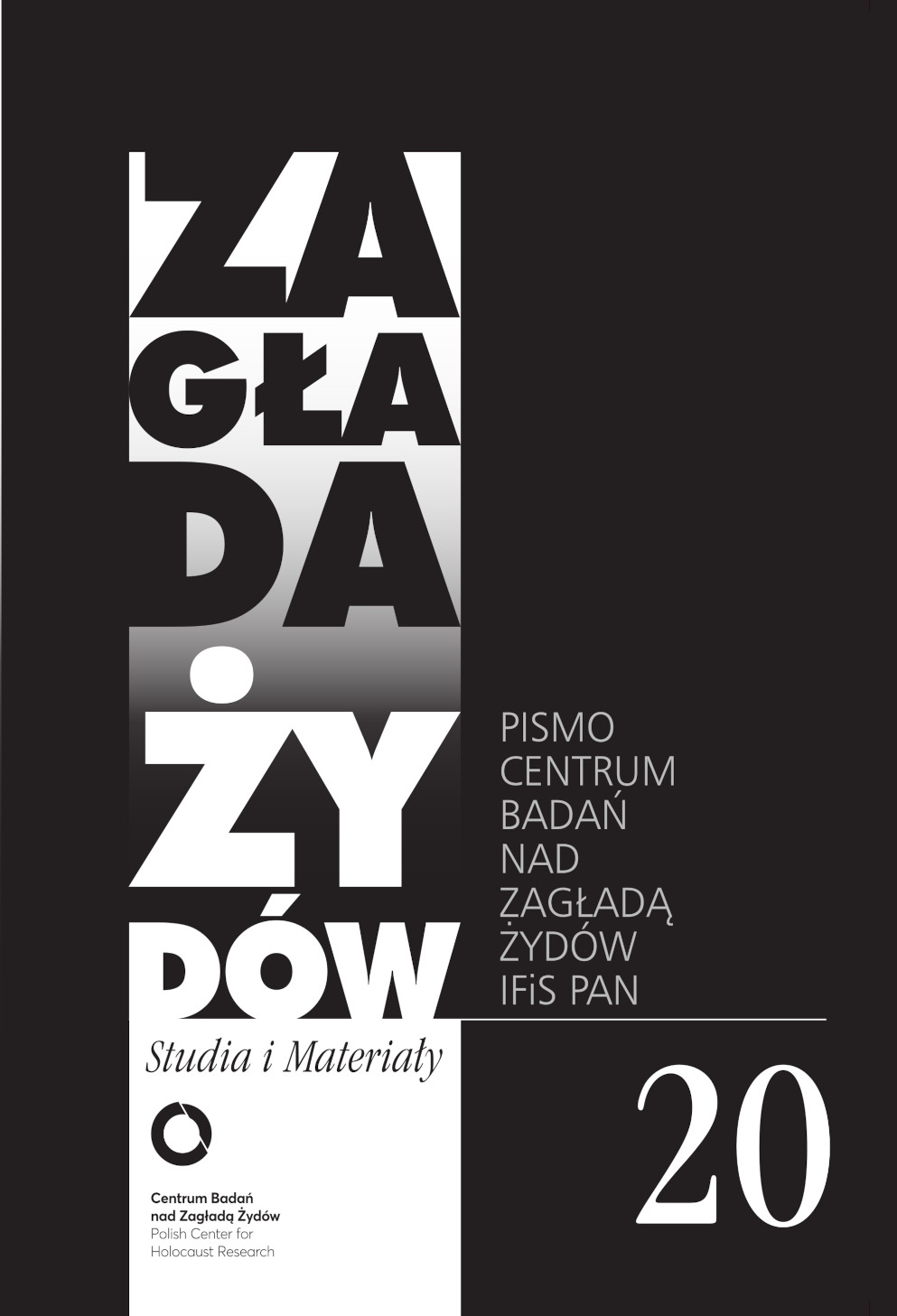Emotions as testimony: Documenting the psychological aspects of witnessing in an early survivor historical commission
Zagłada Żydów. Studia i Materiały, No. 20 (2024), pages: 276-292
Publication date: 2024-12-17
Abstract
In 1945–1946, nine Polish former prisoners of Nazi concentration camps (one Jewish and eight non-Jewish) living in Sweden as refugees were employed to record other Jewish and non-Jewish Poles’ experiences of persecution for history and justice. Although none of these individuals were psychologists, they believed recording the psychological aspects of witnessing was essential to their documentation work. The written testimonies they recorded, which are preserved in the archive of the Polish Research Institute in Lund, Sweden (PIZ), thus include revealing and often caring comments about the witnesses’ emotions and emotional responses during the interviews. I argue that this method made emotions integral to the testimonies and validated emotions as testimony. The significance of this argument is magnified when non-Jewish Poles interviewed Jewish Poles and vice versa since the comments reveal how they were relating to one another on a personal and sensitive level. This article builds on the author’s previous and ongoing analyses of these witness testimonies through close readings of the comments that consider the psychological aspects of witnessing. By contextualizing these comments and the testimonies they refer to alongside theories on the value of emotions for knowledge, the author explores what knowledge the method of recording witness testimonies contributed to creating in the early postwar period and what knowledge it creates now.
Keywords
The Polish Research Institute in Lund, Sweden, Polish survivors of Nazi persection, Holocaust survivors, early survivor testimonies, emotions, knowledge, survivor historical commissions, Post Traumatic Stress Dissorder (PTSD)
References
Żródła archiwalne / Archival sources
Lund University Library (LUB), Sweden, The Polish Research Institute in Lund (PIZ) Archive
Literatura przedmiotu / Studies
Michael S. Brady, “Learning from Adversity: Suffering and Widsom,” Chapter 9 in The Value of Emotions for Knowledge, ed. Laura Candiotto, Switzerland: Palgrave Macmillan, 2019, pp. 197–214.
Laura Candiotto, ed. The Value of Emotions for Knowledge, Switzerland: Palgrave Macmillan, 2019.
Laura Candiotto, “Emotions In-Between: The Affective Dimension of Participatory Sense-Making,” Chapter 11 in The Value of Emotions for Knowledge, ed. Laura Candiotto, Switzerland: Palgrave Macmillan, 2019, pp. 235–260.
Beth B. Cohen, “The Helping Process: Mental Health Professionals' Postwar Response to Survivors,” Chapter 7 in Case Closed: Holocaust Survivors in Postwar America, New Jersey: Rutgers University Press, 2007, pp. 133–54.
Boaz Cohen, “The Children's Voice: Postwar Collection of Testimonies from Child Survivors of the Holocaust,” Holocaust and Genocide Studies, 21/1, pp. 73–95, https://doi.org/10.1093/hgs/dcm004.
Marc-Antoine Crocq & Louis Crocq, “From shell shock and war neurosis to posttraumatic stress disorder: a history of psychotraumatology,” Dialogues in Clinical Neuroscience, 2/1, pp. 47–55, https://doi.org/10.31887/DCNS.2000.2.1/macrocq.
Izabela A. Dahl, “Witnessing the Holocaust: Jewish Experiences and the Collection of the Polish Source Institute in Lund,” Chapter 3 in Early Holocaust Memory in Sweden: Archives, Testimonies and Reflections, eds. Johannes Heuman and Pontus Rudberg, Basingstoke & New York: Palgrave Macmillan, 2021, pp. 67–91.
Paul Friedman, “The Road Back for the DPs: Healing the Psychological Scars of Nazism,” Commentary, December 1948.
Eugeniusz Stanisław Kruszewski, Polski Instytut Żródłowy w Lund (1939-1972): Zarys historii i dorobek, Londyn; Kopenhaga: Polski Uniwersytet na Obczyźnie; Instytut Polsko-Skandynawski, 2001.
Victoria Van Orden Martínez, Afterlives: Jewish and Non-Jewish Polish Survivors of Nazi Persecution in Sweden Documenting Nazi Atrocities, 1945–1946, Ph.D. diss., Linköping University, 2023.
Victoria Van Orden Martínez, “Survivor-Refugee Humanitarianism: A New Perspective of Second World War Humanitarianism in Sweden,” Women and humanitarian aid - a historicizing perspective Conference, Örebro University, 2021.
Victoria Van Orden Martínez, “Witnessing against a divide? An analysis of early Holocaust testimonies constructed in interviews between Jewish and non-Jewish Poles,” Holocaust Studies 28/4, pp. 483–505.
Cecilea Mun, “How Emotions Know: Naturalizing Epistemology via Emotions,” Chapter 2 in The Value of Emotions for Knowledge, ed. Laura Candiotto, Switzerland: Palgrave Macmillan, 2019, pp. 27–50.
Alan Rosen and Neal Lipsitz. “Oral Memoirs: The Testimony of Holocaust Survivors.” Oxford Research Encyclopedia of Psychology. 27 Aug. 2020, https://doi.org/10.1093/acrefore/9780190236557.013.480.
Jerome Rosenberg, “Holocaust Survivors and Post-Traumatic Stress Disorders: The Need for Conceptual Reassessment and Development,” The Journal of Sociology & Social Welfare 11/4, pp. 930–938, https://doi.org/10.15453/0191-5096.1683.
Paul Rudny, ”Zygmunt Lakocinski och polska källinstitutets arkiv i Lund 1939–87,” in Skandinavien och Polen. Möten, relationer och ömsesidig påverkan, ed. Barbara Törnquist-Plewa, Lund: Lund University Press, 2007, pp. 177–201.
Murray B. Stein, and Barbara O. Rothbaum, “175 Years of Progress in PTSD Therapeutics: Learning from the Past,” The American Journal of Psychiatry, 175/6, pp. 508–516, https://doi.org/10.1176/appi.ajp.2017.17080955.
Andrzej Nils Uggla, I nordlig hamn: Polacker i Sverige under andra världskriget, trans. Lennart Ilke. Uppsala: Centrum för multietnisk forskning, Uppsala Universitet, 1997.
Netografia / Websites
American Psychiatric Association, “What is Posttraumatic Stress Disorder (PTSD),” https://www.psychiatry.org/patients-families/ptsd/what-is-ptsd, last accessed 8 January 2024.
Lund University Library (LUB) “Witnessing Genocide” digital archive: https://www.ub.lu.se/hitta/digitala-samlingar/witnessing-genocide, last accessed 6 January 2024.
License
Copyright (c) 2024 Zagłada Żydów. Studia i Materiały

This work is licensed under a Creative Commons Attribution-NonCommercial-NoDerivatives 4.0 International License.
 English
English
 Polish
Polish




